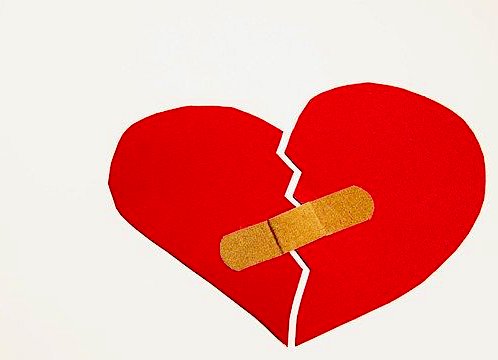Moving on is a necessary part of life

As much as we single people fight moving on, we have to admit it is a necessary part of life.
Most of us cling to something far longer than we should. I have made that mistake, not just once but many times. I had the misguided notion that if I held on, even just mentally, I could restore what I had lost. It never worked.
Everybody likes the familiar. It's comfortable. That's what keeps us from reaching out, even when we know we should. We enjoy our ruts. When somebody kicks us out of one, we don't like it and we try to climb back in.
Whether for good or bad, nothing stays the same. Life keeps moving on. Let's look at how we singles can make those difficult changes to keep going forward instead of living in the past.
Pain keeps us from moving on
Pain has a way of fastening itself in our memory, like a parasite sticks to the side of its host. And like a parasite, pain can suck the life-blood out of us.
I try to avoid pain whenever possible. You probably do too. Unfortunately, sometimes pain is necessary to fix a problem. The first step in fixing a problem, of course, is admitting a problem actually exists.

It's easy to deny we need to move on because moving on can be painful. It also takes courage. We're facing the unknown future, and that can be scary. So we put it off and put it off, unsure of what to do. All the while, this emotional toothache keeps throbbing, and like a trip to the dentist, solving it is going to cause some pain. Denying reality has never been a very effective way to solve a problem.
Sometimes I waited until the pain was unbearable before I acted. Looking back, I realize I could have spared myself a lot of suffering if I had faced reality sooner. But I've often been a slow learner.
Wise, trusted friends can help us in moving on. They can tell us how they did it. We can glean advice from the Bible. When we pray, the Holy Spirit acts in mysterious ways to nudge us into doing the necessary thing. He plants the idea and gives us the strength to act, if we listen and don't tune him out
Study, but not too long
There's a lot of talk in Christian circles about waiting on God. Some preachers teach we shouldn't move until God gives us a sign. For single people, that can turn into an excuse to stay in our rut.
I'm all for trying to follow the will of God, but sometimes we just can't discern it, no matter how hard we try or how long we wait. I believe it's an insult to God to think that if we step out in faith and make a mistake that he can't fix it. The often-quoted Romans 8:28 says God can bring good out of our bad situation if we are committed to serving him.

One way I've found to reduce anxiety about moving on is to sit down with pencil and paper and write out the possible paths I could take and the possible outcomes of each. Since I'm not God and can't know the future, I can't always predict the consequences, but thinking things through before making an impulsive decision seems like a better way to me.
That can be a time when the Holy Spirit injects some of his wisdom into your mind. You may see things you never considered before. Knowing the possible consequences helps you plan for them, removing much fear from the equation. This tried-and-true strategy is called "looking before leaping."
When you have your possible paths more clear, that's a good time to run them by the person or persons you trust. Their fresh eyes may see things you didn't.
Moving on takes different methods
The types of things we need to move on from are as varied as our personalities:
- What people thought of you in school
- Hurtful criticism somebody made
- Fixation on some aspect of your appearance
- Romances that ended years ago
- Former jobs
- Friends or relatives who disappointed you
- Past failure
- The death of a loved one
This partial list shows some hurts are much more serious than others, but the common factor is that obsessing over them cannot resurrect the good thing you lost.

All losses cause grief. The degree of grief and its length should depend on the seriousness of the loss. Losing a dollar bill doesn't compare to the death of a spouse.
We each grieve in our individual way and on our own timetable. Grief is healthy, but even it has to come to an end if we're serious about moving on.
When my father died, my mother said, "I'm not going to be sad for the rest of my life." Although she still misses my father, in the 25 years since his death, she has had many happy experiences and has enjoyed her life. I'm proud of her.
If you think you've been grieving a loss too long, it's time to seek professional help. This article should serve as a signpost to point you to someone who knows much more about this than I do.
Be kind to your mind
As single people, you and I live in our minds more than married folks who have less alone time to rerun things. We singles tend to revisit thoughts again and again.
Whether it's a past relationship or a past job, moving on frees you to think thoughts that build you up rather than drag you down. I'm sure you've heard the old story about the man who was hitting himself in the head with a hammer. His friend asked him why he was doing it and he replied, "Because it feels so good when I quit."
I've often hammered myself with blame over the past, and believe me, it does feel good when you quit. You and I may still engage in hammering ourselves sometimes, but we can sure learn to quit sooner. The sooner the better.
Years ago I was such an expert at beating myself up that I wrote this article about it in case anyone else did it too. This kind of self-bullying is a perverted, destructive behavior not limited to single people. But we all need to stop it and move on.

No matter what you're berating yourself about, taking action to correct it then moving on is crucial to your mental and physical health. God didn't create you to be a human punching bag—with you doing the punching.
Take a week or two to think about the ideas in this article, then come back and read it again. Moving on from past hurts will make you lighter and more nimble. It's like removing heavy ankle weights you might have worn in athletic training. When you take them off, you feel as if you could fly—and maybe you can!
Moving on: The How-to

So how do you move on once you realize that's the wisest course of action?
Here are a few things that helped me, although the list is far from exhaustive:
1. Learn how to STOP
Identify the culprit thoughts. Some memories start you down the rabbit hole of regret. As soon as one of those thoughts comes into your mind, mentally shout "Stop!" And switch your thinking to something else. Remember, you can't think about two things at the same time. Redirect your focus to a positive path.
2. Don't indulge yourself.
Sometimes we singles think, "Well, thinking about it (him, her, whatever) a little won't hurt." That's like saying, "A little poison won't hurt me." Recognize these harmful thoughts for the danger they are. Then employ Step 1 above.
3. The present is where you live; the future is what you plan for.
Just as you don't go out to your trash can and dig through the garbage trying to relive the meals you ate, don't dig through the garbage memories in your past. There's plenty to keep your mind occupied about today. And, by saving money, exploring hobbies, and planning upcoming vacations, you can build hope into your future.
4. You can't get justice with imaginary scenarios.
Are you like me? Do you repeatedly replay conversations or hurts imagining what you should have said or should have done? We all seek justice after we've been wronged. We play these little games trying to restore our sense of worth, if only in our own mind. Know what? They don't work. I've tried. Shut off the floodlights in the tiny theater inside your head and move on.
5. Trust God with it.
This is the most important lesson I've ever learned about moving on. God is the ultimate Judge and he hands out justice. What's more, he's always right. Turn the hurt over to him with the assurance that he will handle it. I like The Living Bible's translation of 1 Peter 5:7: "Let him have all your worries and cares, for he is always thinking about you and watching everything that concerns you."
In paperback and Kindle edition on amazon.com








